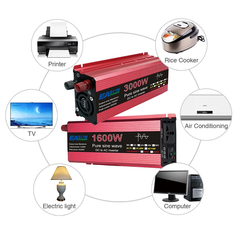In the realm of industrial applications, the importance of reliable and efficient power conversion cannot be overstated. One of the most significant advancements in this field is the pure sine wave inverter. This article delves into the benefits of pure sine wave inverters in industrial applications, providing a comprehensive understanding of their advantages and practical uses.

Understanding Pure Sine Wave Inverters
Pure sine wave inverters convert direct current (DC) into alternating current (AC) that closely mimics the smooth, periodic oscillations of the utility-supplied electricity. Unlike modified sine wave inverters, which produce a rough approximation of AC power, pure sine wave inverters generate a cleaner, more consistent output. This distinction is crucial for sensitive industrial equipment that requires stable power to function optimally.
Enhanced Efficiency and Performance
One of the primary benefits of pure sine wave inverters in industrial applications is their enhanced efficiency. By producing a low harmonic distortion output, these inverters ensure that machinery and equipment operate more efficiently. For instance, motors run cooler and more quietly, reducing wear and tear and extending their lifespan. This efficiency translates into cost savings, as less energy is wasted, and maintenance costs are minimized.
Compatibility with Sensitive Equipment
Industrial environments often rely on sophisticated and sensitive equipment, such as medical devices, communication systems, and precision instruments. Pure sine wave inverters provide the clean power necessary for these devices to function correctly. For example, in a medical facility, equipment like MRI machines and ventilators require stable power to deliver accurate results and ensure patient safety. By using pure sine wave inverters, industries can avoid the risk of equipment malfunction or damage due to power irregularities.
Improved Power Quality
Power quality is a critical factor in industrial settings, where even minor fluctuations can lead to significant disruptions. Pure sine wave inverters contribute to improved power quality by minimizing harmonic distortion and providing a consistent voltage output. This stability is particularly beneficial in manufacturing processes that demand precise control, such as semiconductor fabrication or pharmaceutical production. By maintaining high power quality, pure sine wave inverters help ensure the reliability and consistency of industrial operations.
Environmental and Economic Benefits
In addition to their technical advantages, pure sine wave inverters offer environmental and economic benefits. By enhancing the efficiency of industrial equipment, these inverters reduce energy consumption and lower carbon emissions. This reduction aligns with global efforts to combat climate change and promotes sustainable industrial practices. Furthermore, the cost savings associated with improved efficiency and reduced maintenance contribute to a more economically viable operation.
Real-World Applications
The practical applications of pure sine wave inverters in industrial settings are vast and varied. For example, in renewable energy systems, such as solar or wind power installations, pure sine wave inverters are essential for converting the generated DC power into usable AC power for industrial use. Additionally, in remote or off-grid locations, these inverters provide a reliable power source for critical infrastructure, ensuring continuous operation even in challenging conditions.
Conclusion
Exploring the benefits of pure sine wave inverters in industrial applications reveals their significant impact on efficiency, compatibility, power quality, and sustainability. By providing clean, stable power, these inverters enhance the performance and longevity of industrial equipment, contributing to more reliable and cost-effective operations. As industries continue to evolve and adopt advanced technologies, the role of pure sine wave inverters will undoubtedly become increasingly vital.








